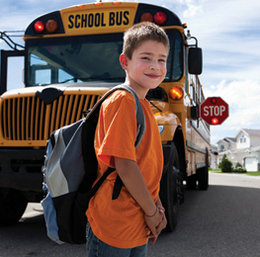
Help my child adjust to a new school?
Mindy Hall, M.Ed., M.A., S.A.C., school counselor at Mary E. Roberts Elementary School in Moorestown and student assistance coordinator for Moorestown High School: “Many factors, other than a child’s academic abilities, can affect how well a child settles into a new school environment. To ensure a positive adjustment, strong support systems need to be established within the family and the school community. Depending on each child’s age and developmental level, realize they will be encountering some emotional difficulties. Encourage your children to share their feelings. When they speak of fears about entering a new school, missing former friends and teachers, or worries about meeting new people, make sure to validate and respect their feelings. Understand that even though a new move might be viewed as exciting, children may still experience a period of grieving. Also, help familiarize your children with the new school, neighborhood and community before the move even happens. Go online to research information about your child’s new school. If possible, call the new school and ask to arrange a tour of the school with the principal or counselor. Introduce yourself to school personnel and share pertinent academic or behavioral history. Once your move happens, try to get back into your family’s normal routine. If your children were involved with extracurricular programs in their old school, try to find equivalent programs for them in the new setting. Not only will your child meet new friends, but participation in community or school group activities allows parents to network as well.”
What Are Kids Thinking?
We asked Cherry Hill teen Max Yankowitz, 15: Do you think kids’ lives today are too stressful?
“Kids’ lives are extremely stressful, especially in high school. When I come home from school, I have so much work to do that there’s hardly any time for TV, computer, videogames, etc. Also, with all of the after-school activities that I do, I have even less time to get work done. Sometimes it’s tough just to get a good seven hours of sleep. With all of the extracurricular activities that I want to do, it becomes really difficult to know when you’re going to hang out with your friends, especially on the weekend. I commonly have to choose between going to the movies with my friends, or finishing up an essay that’s due Monday.”
Mom vs. Mom
We asked two moms, “What’s the right age for a child to receive a cell phone?”
Samantha Sklar, Cherry Hill mother of Brett, 16, and Rachel, 14:
“We decided to give our children cell phones once they were ready for middle school. Up until that point it was really not needed. I drove them to school, and they really were not anywhere where they would need to reach us. Once ready for middle school, there was the bus stop and the chance of missing the bus and sports after school, as well as a more independent social life. We got them for the children also for a way for us to reach them as well. Our son is now 16 and a junior, and our daughter is 14 and in the eighth grade. The phones come in handy for us to keep tabs on them. They can check in with us by text or phone call if they need to be picked up somewhere or if there is a change in schedule. They do each have an iPhone, but we require them to pay us each month for the data plan that is required to go along with that phone. If that’s what they wanted, then they needed to do that—and they do.”
Lori Colino, Voorhees mother of Marla, 11:
“I gave my daughter her first cell phone in first grade. It was a Firefly cell phone. I entered all the contacts and phone numbers and then purchased prepaid minutes. At age 6, the cell phone was for emergency situations, (tennis practice ending earlier due to rain), not for social use. After seeing that my daughter was responsible using her Firefly, at age 8, I gave her an inexpensive cell phone with unlimited texting. I do make it a point to review the contacts she entered and I browse her text messages. This year I passed down my iPhone 3. It’s a bit extravagant for an 11-year-old, however, she uses it for texting, talking, as her iPod, apps for helping with homework and, of course, games! My daughter is responsible for any downloads from her allowance. The appropriate age depends on the maturity of your child and your comfort level. I have comfort knowing my child has a cell phone with her at all times, but I respect the parents who say, ‘My child does not need a cell phone.’”
Published (and copyrighted) in Suburban Family Magazine, Volume 1, Issue 11 (February, 2011).
For more info on Suburban Family, click here.
For information about advertising in Suburban Family, click here.
To find out where to pick up your copy of Suburban Family, click here.




